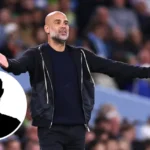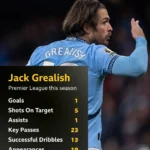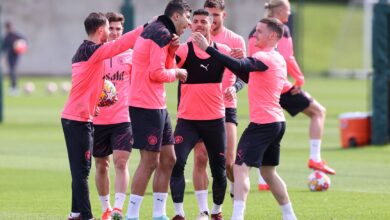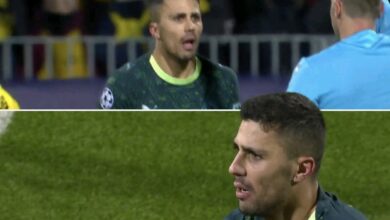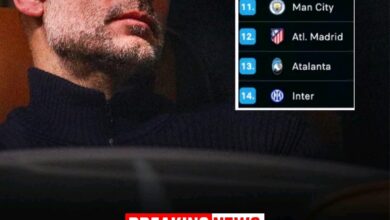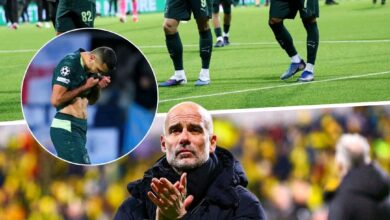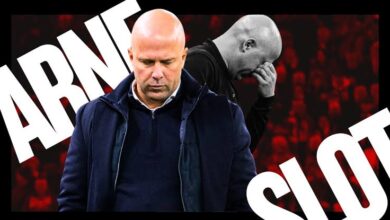Where next for City if he leaves Man City as expected?
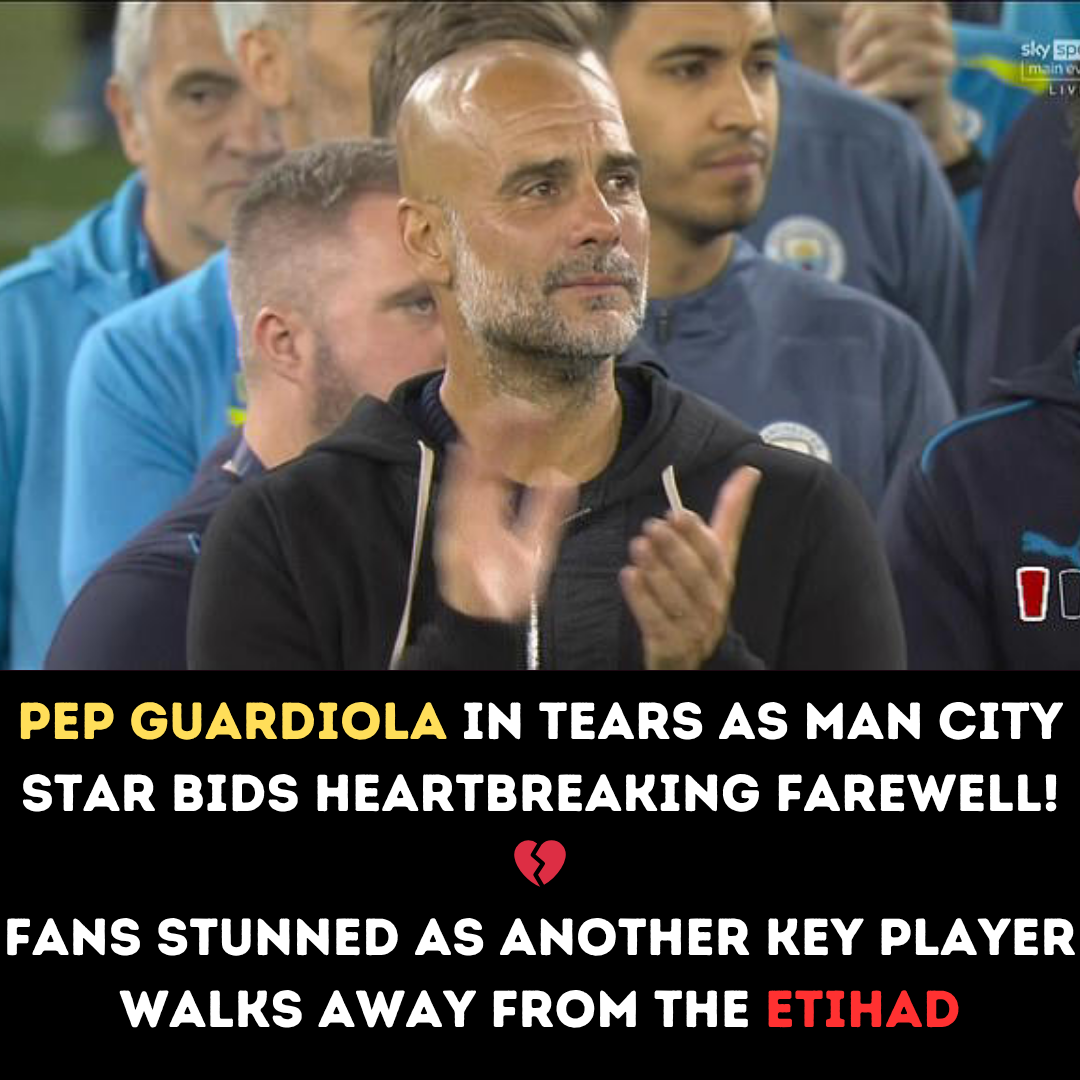
When Jack Grealish stepped onto the pristine training pitches of Manchester City’s Etihad Campus in August 2021, he carried with him the weight of expectation that comes with being the most expensive British player in football history. “It’s a dream come true to be part of this club,” the Birmingham-born midfielder declared in his inaugural interview, his eyes gleaming with the prospect of working under Pep Guardiola and competing for the sport’s most coveted trophies.
Manchester City had shattered transfer records to secure Grealish’s signature, paying Aston Villa an unprecedented £100 million for the England international’s services. The fee represented not just a financial investment, but a statement of intent from a club already dominating English football. Guardiola saw in Grealish a unique talent capable of unlocking the most stubborn defensive structures, a player whose blend of pace, skill, and creativity could elevate City’s already formidable attacking arsenal to new heights.
The initial seasons seemed to validate this ambitious gamble. Grealish became an integral part of a Manchester City side that would go on to achieve unprecedented success, capturing three Premier League titles during his tenure. Most memorably, he played a crucial role in City’s historic Treble-winning campaign of 2022-23, contributing to one of the most dominant seasons in English football history. The sight of Grealish celebrating with the Premier League, FA Cup, and Champions League trophies represented the pinnacle of his career achievements.
However, football’s narrative arcs rarely follow predictable trajectories, and Grealish’s Manchester City story has taken a dramatically different turn over the past two years. What began as a dream has gradually transformed into what many observers now characterize as a nightmare, with the 29-year-old finding himself increasingly marginalized at the club he once hoped would define his legacy.
The Decline: Injuries, Form, and Lost Opportunities
The transformation of Grealish’s Manchester City experience from triumph to tribulation has been neither sudden nor solely attributable to a single factor. Instead, it represents a complex interplay of injuries, declining form, tactical evolution, and the relentless competition for places that defines elite football. Over the past two seasons, a combination of physical setbacks and performances that have fallen well short of his previous standards have conspired to limit Grealish to just 17 Premier League starts.
The statistics paint a stark picture of a player whose influence has dramatically diminished. During the 2024-25 season, Grealish managed just 715 minutes of Premier League football, a figure that represents less than eight complete matches across an entire campaign. For a player who was once considered indispensable to both club and country, these numbers represent a precipitous fall from grace that few could have predicted when City invested their record fee.
The impact of Grealish’s reduced playing time extended far beyond the confines of Manchester. His lack of regular first-team football had direct consequences for his international career, ultimately costing him a place in England’s squad for Euro 2024. For a player who had been a regular feature in Gareth Southgate’s plans, missing a major tournament represented perhaps the most painful consequence of his club struggles.
The 2024-25 season proved particularly challenging for Grealish, with the midfielder finding himself relegated to the role of unused substitute on ten separate occasions during the second half of the campaign. These extended periods on the bench, watching as City navigated their most difficult season under Guardiola’s management, served as a constant reminder of how dramatically his circumstances had changed. While City ultimately secured Champions League qualification, their struggles throughout the season provided little consolation for a player desperate for regular football.
Guardiola’s Dilemma and City’s Evolution
Pep Guardiola’s relationship with Jack Grealish represents one of the most intriguing subplots in this unfolding drama. The Catalan coach, renowned for his ability to extract the maximum potential from every player in his squad, has found himself unable to consistently accommodate Grealish within his evolving tactical framework. This situation has created a unique challenge for a manager who rarely encounters players he cannot successfully integrate into his system.
Despite the apparent breakdown in Grealish’s playing opportunities, those close to the situation emphasize that both Guardiola and the City board retain significant affection for the player. His attitude during training sessions has remained exemplary, and his popularity among teammates has never wavered, even as his playing time has diminished. These qualities, combined with his undeniable technical ability, explain why the decision to part ways has been reached with considerable reluctance on all sides.
The reality, however, is that modern football operates according to ruthless efficiency principles, and sentiment rarely influences major decisions at elite clubs. Guardiola’s public statements about wanting a smaller squad for the upcoming season provide crucial context for understanding City’s position. The Spanish coach has identified squad size as a factor that can complicate player management and team harmony, particularly when talented individuals are unable to secure regular playing time.
City’s recent transfer activity and rumored targets further illuminate their thinking regarding Grealish’s future. The signing of midfielder Tijjani Reijnders and persistent links with playmaker Rayan Cherki suggest that the club is actively seeking alternatives who might better fit Guardiola’s current tactical preferences. These developments, combined with Grealish’s exclusion from City’s squad for the FIFA Club World Cup in the United States, indicate that his time at the Etihad Stadium is drawing to a close.
The Player’s Perspective: Seeking a Fresh Start
From Grealish’s standpoint, the decision to leave Manchester City represents an opportunity to revitalize a career that has stagnated despite being surrounded by world-class talent and infrastructure. After enduring a difficult season both on and off the field, the England international has reached the conclusion that his best interests lie in securing a permanent move to a club where he can rediscover the form and confidence that made him one of English football’s most coveted players.
The midfielder’s preference for a permanent transfer rather than a loan arrangement reflects his desire for stability and long-term planning. Unlike other high-profile players who have opted for temporary moves to rebuild their careers, Grealish wants to establish roots at a new club where he can commit fully to a new project. This approach demonstrates maturity and suggests that he recognizes the need for a complete change of environment rather than a short-term solution.
Grealish’s openness to exploring various options while maintaining certain preferences reveals a player who understands his current market position while retaining ambition for his career trajectory. His desire to continue competing at the highest possible level, ideally in the Champions League, indicates that he has not abandoned his aspirations for major honors and international recognition. This mindset will be crucial in determining which opportunities he ultimately pursues.
The psychological aspect of Grealish’s situation cannot be underestimated. For a player who has experienced the highest highs of winning the Treble, the contrast with his current circumstances must be particularly difficult to process. The prospect of a fresh start at a new club offers not just renewed playing opportunities but also the chance to escape the weight of expectations and comparisons that have defined his recent experiences.
Potential Destinations: Premier League Options
The English Premier League remains the most logical destination for Grealish’s next career move, offering the dual advantages of familiarity and continued exposure at the highest level of competition. Several clubs have been linked with potential moves, each presenting unique advantages and challenges that could influence the player’s ultimate decision.
Tottenham Hotspur emerges as perhaps the most intriguing option among Premier League suitors. Spurs can offer Champions League football for the upcoming season, fulfilling one of Grealish’s key criteria for his next destination. The North London club’s style of play under their current management could provide an ideal platform for Grealish to rediscover his best form, particularly given their emphasis on creative players who can operate in multiple positions across the front line.
However, Tottenham’s financial situation presents significant complications. The club reportedly owes more than £330 million in unpaid transfer fees, with a considerable portion due during the upcoming summer transfer window. This debt burden could severely limit their ability to finance both a transfer fee and the wages that Grealish would command, potentially making this option more theoretical than practical.
Newcastle United represents another compelling possibility, particularly given their improved financial position following recent ownership changes. The Magpies possess greater wage capacity than many Premier League clubs, though Grealish would still need to accept a significant reduction from his current Manchester City salary. Newcastle’s participation in European competition adds to their appeal, though their profit and sustainability rules situation could complicate any potential transfer fee negotiations.
A romantic return to Aston Villa continues to capture the imagination of supporters and media alike, given Grealish’s status as a boyhood fan and former captain of the Birmingham club. However, the financial realities make such a move highly unlikely in the current market. Villa’s wage-to-revenue ratio of 91% in 2024 represents one of the highest in the Premier League, forcing the club to prioritize reducing their wage bill rather than adding expensive acquisitions.
Furthermore, questions remain about whether Grealish fits the profile of player that Unai Emery wants to build his team around. The Spanish coach has implemented a specific tactical approach at Villa Park that emphasizes defensive solidity and tactical discipline, qualities that may not align perfectly with Grealish’s natural playing style and preferences.
Everton, despite their historical interest in high-profile signings, lack the financial resources to seriously compete for Grealish’s signature. The Merseyside club’s ongoing financial struggles and need to comply with profit and sustainability regulations make them unlikely candidates for such an expensive acquisition.
Continental Possibilities: European Adventures
The prospect of Grealish testing himself in European football presents fascinating possibilities, potentially offering the player a chance to experience different tactical approaches and cultural environments while continuing to compete at elite level. Several continental clubs have been mentioned as potential suitors, each representing different types of opportunities and challenges.
Barcelona’s initial interest in Grealish generated considerable excitement, given the Catalan club’s prestigious history and current rebuilding project under their management team. However, the Spanish giants’ well-documented financial difficulties have effectively ended their pursuit, with the club prioritizing other areas of recruitment and unable to accommodate Grealish’s wage demands within their tight budget constraints.
Italian football presents more realistic opportunities, with both AC Milan and Napoli mentioned as potential destinations. These clubs offer the attraction of Serie A competition and the chance to experience one of Europe’s most tactically sophisticated leagues. However, both Italian clubs would struggle to match Grealish’s current wage expectations, requiring significant compromise from the player to make such moves financially viable.
Napoli’s reported interest in Kevin de Bruyne, Grealish’s former Manchester City teammate, adds an intriguing dimension to their potential pursuit. The possibility of reuniting with De Bruyne could appeal to Grealish, particularly given their successful partnership during City’s Treble-winning season. However, the financial challenges remain substantial, and Napoli would likely need to structure any deal creatively to accommodate both players’ wage requirements.
German football represents another possibility, with Borussia Dortmund and potentially other Bundesliga clubs offering different types of opportunities. Dortmund’s reputation for revitalizing careers and their consistent participation in Champions League competition could appeal to Grealish, though again, wage considerations would require careful negotiation.
Inter Milan, as another potential Italian destination, could offer Champions League football and the chance to compete for major honors in Serie A. The Nerazzurri’s recent success in European competition demonstrates their ambition and quality, potentially providing Grealish with the platform he seeks to rebuild his career at the highest level.
The Saudi Arabia Factor: Financial Temptation vs. Sporting Ambition
The emergence of Saudi Arabia as a major player in the global transfer market adds a complex dimension to Grealish’s situation, offering financial packages that far exceed what European clubs can provide while potentially compromising his sporting ambitions and international prospects. The Saudi Pro League’s aggressive recruitment of high-profile players has created opportunities that simply did not exist in previous transfer windows.
For Grealish, a move to Saudi Arabia would represent the ultimate financial security, with clubs in the region capable of not only matching but significantly exceeding his current Manchester City wages. The tax advantages and lifestyle changes associated with such a move could provide long-term financial benefits that dwarf any European alternatives.
However, the sporting and reputational implications of such a decision would be significant. Many observers would interpret a move to Saudi Arabia as an admission that Grealish’s career at the highest level has effectively ended, potentially damaging his prospects for future England selection and elite European competition. The example of Ivan Toney’s recent England recall after his move to Al-Ahli provides some encouragement, but the general perception remains that players who move to Saudi Arabia are prioritizing financial gain over sporting achievement.
The timing of any potential Saudi move could prove crucial for Grealish’s long-term prospects. At 29, he theoretically has several years of peak performance remaining, making him an attractive proposition for clubs seeking immediate impact rather than long-term development. However, the same age profile means that any extended period away from European football could effectively end his chances of returning to elite competition.
Financial Complexities: The Wage Conundrum
The financial aspects of Grealish’s potential departure from Manchester City represent perhaps the most significant obstacle to completing any transfer. His reported weekly wage of £300,000 places him among the highest-paid players in world football, a figure that severely limits the number of clubs capable of affording his services without significant compromise from the player himself.
Manchester United and Liverpool represent the only Premier League clubs with the financial capacity to match Grealish’s current wages, but neither has shown interest in acquiring his services. This lack of interest from football’s biggest spenders effectively eliminates the most obvious destinations for a player of Grealish’s profile and wage expectations.
The reality for most potential suitors is that signing Grealish would require him to accept a substantial reduction in his current earnings. This need for compromise creates a delicate negotiation dynamic where clubs must balance their desire to acquire a talented player against their financial constraints, while Grealish must weigh the value of regular playing time against potential earnings reduction.
Manchester City’s position adds another layer of complexity to these negotiations. While the club would prefer to sell Grealish permanently to remove his wages from their books and recoup some portion of their initial £100 million investment, they acknowledge that they will recover nowhere near their original outlay. This acceptance of financial loss creates some flexibility in negotiations, but City’s preference for a permanent sale rather than a loan deal could still complicate discussions with interested clubs.
The possibility of City subsidizing Grealish’s wages as part of a loan arrangement represents one potential solution to the financial impasse. Such an arrangement would allow interested clubs to acquire Grealish’s services without the full financial commitment, while providing the player with an opportunity to rebuild his career and market value. However, this approach would be costly for City and might not align with their preference for a clean break.
Alternative financial structures, such as significant signing bonuses to compensate for reduced wages or performance-related payment schemes, could provide creative solutions to the wage problem. These approaches would require innovative thinking from all parties and a willingness to structure deals in unconventional ways.
The Loan Alternative: A Compromise Solution
Despite preferences from both Manchester City and Jack Grealish for a permanent transfer, the financial realities of the current market may make a loan arrangement the most practical solution for all parties involved. This option, while not ideal for anyone, could provide a pathway to resolving the current impasse while offering benefits to each stakeholder.
From Manchester City’s perspective, a loan deal would allow them to reduce their immediate wage obligations while potentially preserving some of Grealish’s transfer value for future windows. If the player could rediscover his best form during a loan spell, City might be better positioned to secure a more favorable permanent sale in subsequent transfer periods. The club’s willingness to subsidize wages as part of a loan arrangement demonstrates their recognition that compromise may be necessary to resolve the situation.
For Grealish, a loan move would provide the guaranteed playing time that has been lacking during his recent Manchester City experience. Regular first-team football at a competitive level could help restore his confidence and form, potentially positioning him for either a successful return to City or a more advantageous permanent move in the future. The temporary nature of such an arrangement would also allow him to reassess his options with improved leverage.
Potential destination clubs could benefit from acquiring Grealish’s services without the long-term financial commitment that a permanent transfer would require. This reduced risk profile might encourage clubs that have been hesitant due to wage concerns to enter negotiations, expanding the range of possible destinations for the player.
The success of similar loan arrangements for other high-profile players, such as Marcus Rashford and Jadon Sancho’s recent moves, provides precedent for this approach. These examples demonstrate that temporary moves can benefit all parties when permanent transfers prove financially unfeasible.
However, loan deals also carry inherent risks and complications. The temporary nature of such arrangements can create uncertainty for players and receiving clubs, potentially affecting long-term planning and team building. Additionally, the financial structures required to make loan deals work often involve complex negotiations regarding wage contributions, loan fees, and future purchase options.
Conclusion: A Complex Resolution Required
Jack Grealish’s situation at Manchester City represents one of the most complex transfer scenarios in modern football, involving a player whose talent remains undisputed but whose market value has been complicated by recent performances and extraordinary wage demands. The resolution of this situation will require unprecedented compromise from all parties and creative thinking regarding financial structures and career planning.
The contrast between Grealish’s current circumstances and his peak achievements at Manchester City illustrates the unpredictable nature of football careers and the fine margins that separate success from struggle at elite level. His contribution to City’s Treble-winning season will forever remain part of the club’s history, even as his departure appears increasingly inevitable.
For Grealish personally, the upcoming transfer window represents a crucial juncture in his career. At 29, he retains the physical and technical attributes that made him one of English football’s most coveted players, but time is becoming a factor in his ability to rebuild his reputation and secure his long-term future. The decisions made in the coming months will likely determine whether his best years lie ahead or behind him.
The broader implications of Grealish’s situation extend beyond the individual player to questions about wage inflation, transfer market sustainability, and the increasing financial disparities within elite football. His case demonstrates how quickly circumstances can change for even the most expensive signings and highlights the ongoing challenges facing clubs in managing squad harmony and financial efficiency.
As negotiations continue and various options are explored, one thing remains certain: the resolution of Jack Grealish’s Manchester City future will require all parties to prioritize practical solutions over ideal outcomes. In a transfer market increasingly defined by financial complexity and regulatory oversight, compromise and creativity may prove more valuable than traditional negotiating positions.
The story of Grealish’s Manchester City career serves as a reminder that football success cannot be guaranteed by financial investment alone, and that the path from dream to nightmare can be surprisingly short in elite sport. Whatever his next destination, Grealish will carry with him both the achievements and disappointments of his time at one of world football’s most successful clubs, experiences that will undoubtedly shape the remainder of his career.
